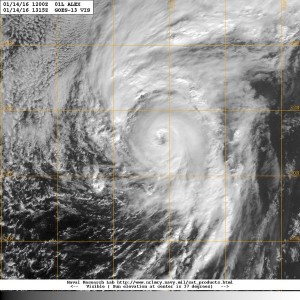Scientists have highlighted the possibility that the heightened period of hurricane activity that began more than 20 years ago has ended, suggesting that insurance-linked securities (ILS) investors with related exposures could need to adjust their view of the peril, according to Deutsche Bank Securities.
 It’s been more than a decade since Florida experienced the impacts of a landfalling hurricane, yet between 1995 and 2012 the North Atlantic Ocean has been in an active phase of the Atlantic Multidecadal Oscillation (AMO), a period that some scientists and weather experts believe relates to an increase in hurricane activity.
It’s been more than a decade since Florida experienced the impacts of a landfalling hurricane, yet between 1995 and 2012 the North Atlantic Ocean has been in an active phase of the Atlantic Multidecadal Oscillation (AMO), a period that some scientists and weather experts believe relates to an increase in hurricane activity.
Referencing a publication in the Nature Geoscience Journal from Dr. Klotzbach, Dr. Gray, and Dr. Fogarty, that suggest the active hurricane phase could have actually ended in 2012, Deutsche Bank Securities ILS team questions if a transition to an inactive AMO phase has any impact on how insurance-linked investors assess their exposure to hurricane risks.
For those that believe the AMO cycle has a direct impact on the frequency of hurricane activity this suggests that being in the current inactive phase relates to a reduction in hurricane activity, underlining a potential need for ILS investors participating in hurricane risk to adjust, or rethink their allocation and modelling approach to the peril, says Deutsche Bank Securities.
It’s important to stress that the paper from the above-mentioned authors and the analysis from Deutsche Bank Securities does simply suggest that the cycle has now entered into the inactive phase, so by no means should this be taken as conclusive.
Furthermore, some weather experts feel that AMO activity doesn’t actually have any impact on hurricane activity.
Regarding the ILS space and its investors, of which approximately two-thirds of the catastrophe bond space is exposed to hurricane risks, a transition to an inactive AMO phase and the possible, resulting reduction in hurricane frequency could create a need to rethink modelling approaches and hurricane risk allocations.
This is according to Deutsche Bank, author of a recently published report that explores this issue utilising the journal from the previously mentioned doctors.
Third party, independent catastrophe modelling firms used by the ILS sector, and broader insurance and reinsurance markets, implemented and still use today, elevated hurricane frequency catalogues, something that occurred following the 2005 hurricane season.
“The ILS market adopted MTR/WSST hurricane rates following the 2005 season to reflect the period of elevated hurricane activity within the modeled risk metrics,” explains Deutsche Bank.
MTR refers to the current RMS medium term hurricane perspective, while WSST relates to AIR Worldwide’s Warm Sea Surface Temperature catalogue, and since their release in 2006 have been widely adopted by the ILS sector to view hurricane exposures, including pricing, trading, and portfolio reporting purposes, says Deutsche Bank.
Deutsche Bank explains that in order to reflect the colder sea surface temperature witnessed during an inactive AMO phase a “Cold Sea Surface Temperature (Cold SST) rate set could be created” to model hurricane risks during times of reduced activity, or an inactive AMO phase.
“If the ILS market were to simply switch the WSST/MTR to Cold SST modelled hurricane frequency, given consistent pricing to modelled EL, there would be meaningful price reduction for U.S. sponsors, and an increased investor allocation to hurricane risk,” predicts Deutsche Bank.
However, the majority of responses from the 14 ILS investors that Deutsche Bank discussed the issue with cited that despite the potential transition to an inactive AMO phase, they didn’t feel a need to change their view of hurricane risks.
More than 60% of ILS investors that Deutsche Bank spoke to use the WSST/MTR models to asses the risk, while just below 60% of responses said they wouldn’t change their view on the risk should the AMO phase transition to an inactive one.
Similarly, just below 60% of ILS investors said that any transition was unlikely to impact their appetite for assuming hurricane risk, which Deutsche Bank feels could be in part to do with some investors in the space having a seasonal view of the risk that consider short-term impacts on hurricane activity as well.
Despite the responses from ILS investors clearly suggesting that any transition was unlikely to be a concern for them and therefore wouldn’t result in any change in allocation or appetite, or even a need to adjust their modelling approach to reflect the colder sea surface temperature, Deutsche Bank feels it’s “unlikely that a phase shift would have no impact on the market.”
“We would also expect cat bond sponsors, who have been paying spreads on multiples to the WSST/MTR expected losses for over 10 years, to argue for lower pricing based on Cold WSST modeled loss figures,” said Deutsche Bank.
Uncertainty surrounding the transition from an active AMO phase to an inactive one, coupled with other factors that can have an influence on hurricane activity, such as El Nino and La Nina, means it’s unlikely that the pricing of hurricane risk in the ILS space will change in response to any AMO transition.
But as underlined by Deutsche Bank, while “the impact is far from certain, this is an area for interested market participants to follow.”
 View all of our Artemis Live video interviews and subscribe to our podcast.
View all of our Artemis Live video interviews and subscribe to our podcast.
All of our Artemis Live insurance-linked securities (ILS), catastrophe bonds and reinsurance video content and video interviews can be accessed online.
Our Artemis Live podcast can be subscribed to using the typical podcast services providers, including Apple, Google, Spotify and more.































